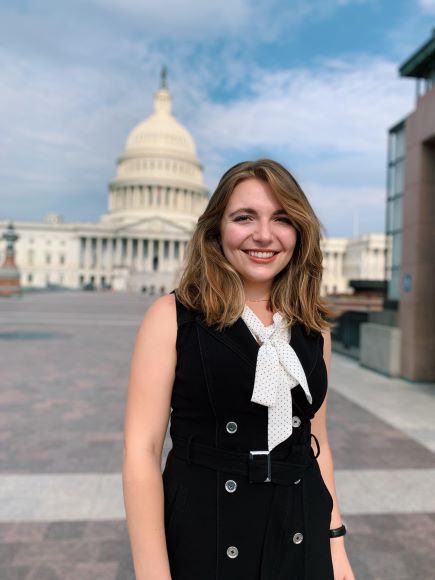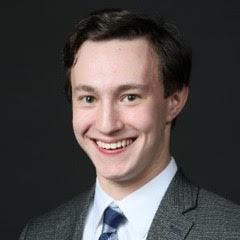Fellowship application process is valuable even when students don’t receive an award
“Always throw your hat in, because even if the application status isn’t what you want it to be, you’ll learn something along the way.”

National fellowships provide students with the opportunity to build their resume and pursue an academic program without having to incur the massive debt that usually comes with studying at a prestigious university. Applying for fellowships often takes months of work, and doesn’t always result in an award. But there are positive takeaways from the effort, according to two students who applied for, but didn’t receive, awards.
Zoe Pidgeon graduated from WSU in 2020 with majors in political science and economics and minors in French and Arabic. In her junior year she applied for the Harry S. Truman Scholarship, which receives over 600 applications for 55-65 scholarships, and last summer applied for the highly competitive George J. Mitchell and Marshall scholarships. Her main help during the application process came from her research mentor, Associate Professor Kevin Deegan-Krause of political science and faculty coordinator for the Office of Fellowships.
“For each of them, the application process was fairly similar,” says Pidgeon. “I began working with KDK and other mentors anywhere from weeks to six months prior to the application, drafting out prior pieces, figuring out how I wanted to frame myself, taking pieces of my collegiate and extracurricular experiences and putting it together into one package.
“After I decided how I wanted to frame myself I would go through all the required pieces of information, such as the recommenders or the essays, and figure out how they spoke to different aspects of myself. I made sure that the recommenders would say something that I hadn’t touched on in my essays. My mentors would extensively edit my essays to make sure they were in tip-top shape before I sent the applications.”
Although she did not receive the scholarships, she says applying was a meaningful learning experience.
“I would say the most valuable thing I got out of this process was being able to examine my experience and passions, and really articulate it in a way that comes across clear to anyone who’s reading it.
“I would advise anyone to start as early as possible. Don’t be timid. People, especially young women, have a tendency to undersell themselves and not necessarily be comfortable speaking about themselves in the way they need to. Don’t be afraid to be confident and brag about yourself a little bit. Always throw your hat in, because even if the application status isn’t what you want it to be, you’ll learn something along the way.”

Benjamin Blumenstein , another 2020 grad, applied for the Rhodes Scholarship after getting an encouraging email from Deegan-Krause offering to help him during the application process. With a degree in education, learning design and technology, Blumenstein realized he was going to have to narrow his personal focus.
“I think the most difficult part was the writing of the personal statement, because that’s where you have to figure out where you want to go, but also why everything you’ve done condenses into what that thing is,” he says. “I’ve always been all over the place. I actually started studying engineering at the University of Pennsylvania. I’m a classically trained ballet dancer and I used to spend my summers at Interlochen studying metalsmithing and sculpture.”
After some introspection, Blumenstein realized that the thing that connected all the “weird” things he had done is that he really likes to learn.
“I like learning new things and learning how to learn new things,” he explains. “So that ended up being what I centered my personal statement around.” It was a fitting choice for Blumenstein, who has run a nonprofit with his siblings since 2016. The organization, called KidsRead2Kids, seeks to help children with learning disabilities find a love for reading and learning.
Blumenstein also recommends anyone applying to get started early. “You have very broad options for your letters of recommendation, you have eight,” he says. If you trust your recommenders, this can be a big positive, because the more you use your recommendations as pockets into different things you’ve done the more you get to show about yourself. Until they review that application and admit you for an interview, that’s all they’re going to see, so you want to give them as much as you can.”
While Blumenstein was not selected for a Rhodes, he says the process was an important one for his own development.
“My biggest takeaway from this process was easily the centering of my goals,” he says. “I was majoring in education and I had been working on this nonprofit since 2016, but I had never really thought about where I wanted it to lead. I had all these different ideas about what I wanted to do. Applying allowed me to put myself in a position to realize I wanted to facilitate a broad change in the education system.”
The assistance from mentors was key to the process, Pidgeon says. “Wayne State is a school that gives you exactly what you put into it. All the opportunities are there for you if you put yourself out there and get into it. If you delve into it, then you’ll get everything you ever wanted out of it.”
Students interested in applying for a national fellowship can contact the Office of Fellowships at fellowships@wayne.edu for assistance or visit oip.wayne.edu/fellowships for more information.
By Jacob Stocking, Office of International Programs communications associate
The Office of Fellowships is part of the Office of International Programs, which leads Wayne State’s global engagement by creating opportunities that foster international education and research, facilitate the exchange of individuals and ideas that promote global competencies and citizenship, and provide resources that support the expansion of the university’s global agenda. Follow us @WayneOIP.